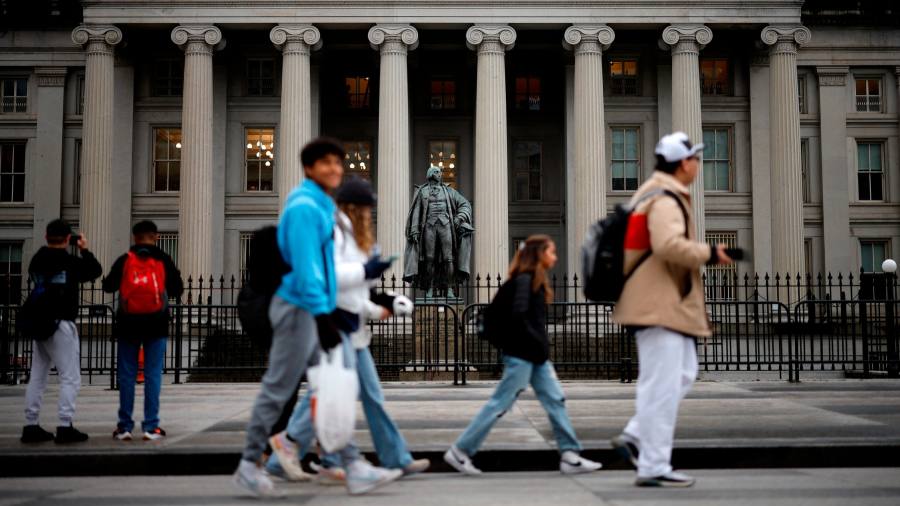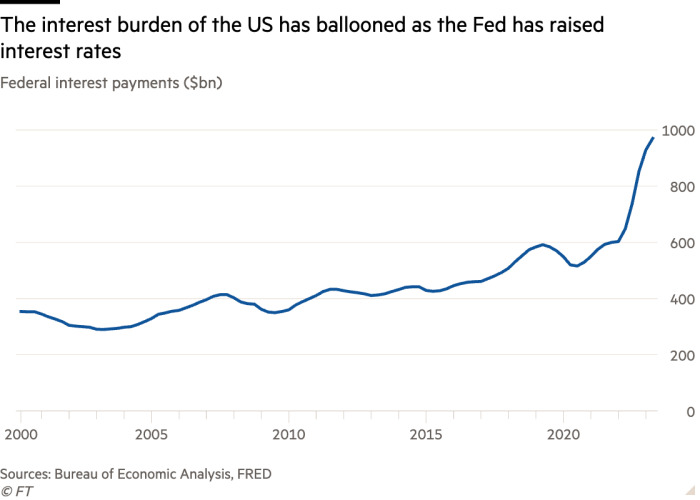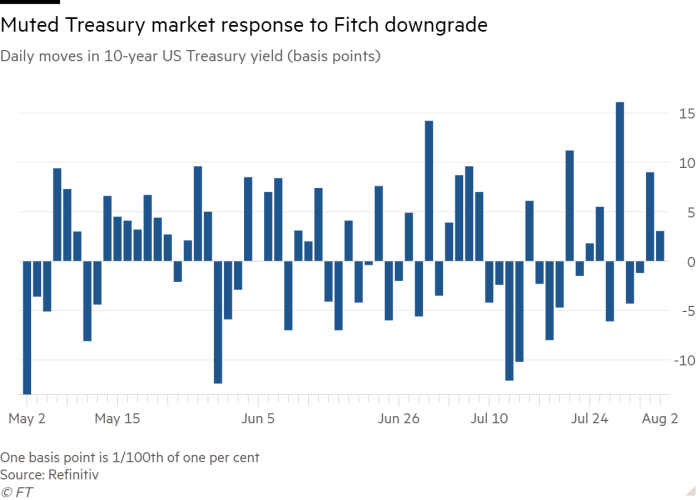
Receive free US economy updates
We’ll send you a myFT Daily Digest email rounding up the latest US economy news every morning.
The reaction to Fitch Ratings’ downgrade of the US’s pristine debt rating played out on a split screen on Wednesday: outrage from the White House and relative calm among investors in the market for Treasury bonds assessed by the agency.
Fitch late on Tuesday lowered the US long-term rating one rung from triple A to double A plus, citing the country’s growing debt burden and an “erosion of governance”, including on fiscal matters. The action came two months after the country narrowly averted default amid political wrangling over the federal borrowing limit.
The Biden administration reacted with anger, sending out a release citing pundits calling the decision “off-base”, “absurd” and “widely & correctly ridiculed”.
“It defies reality to downgrade the United States at a moment when President Biden has delivered the strongest recovery of any major economy in the world,” said Karine Jean-Pierre, the White House press secretary.
The White House appeared to fear that the downgrade gave Republicans a new opening to accuse Biden officials of mishandling America’s public finances. Democrats had hoped that the budget deal struck with Republican speaker Kevin McCarthy to avoid a debt default in June had put those criticisms to rest.
The action by Fitch came after S&P similarly downgraded the US to double A plus in 2011, following a debt ceiling showdown when Democrat Barack Obama was president.
Fitch raised a red flag over “a steady deterioration in standards of governance over the last 20 years” even with the latest deal to suspend the debt limit until January 2025. Fitch also expects the general government deficit to rise to 6.3 per cent of gross domestic product in 2023, up from 3.7 per cent in 2022.
Adding to the US debt burden are interest payments, which have soared as the Federal Reserve has dramatically lifted interest rates to the highest level in 22 years.

The Treasury department on Wednesday announced that the US would have to borrow more in the coming months.
US Treasuries, which constitute the biggest bond market in the world, are widely held because they are understood to be extraordinarily safe. Nearly every central bank globally is a major holder of Treasuries, and the bonds underpin valuations across asset classes. A lower credit rating means Fitch believes there is a greater risk of a US default.
The exceptional role that Treasury bonds play in global markets, however, is unlikely to change because of Fitch’s decision. Investors, by and large, will not be forced to sell their US debt holdings because of the downgrade, and the country’s cost of borrowing is not expected to go up.
“I think it is completely and totally irrelevant,” said Eric Winograd, director of developed market economic research at AllianceBernstein, the asset manager. “I have been trying to come up with a reason why investors would care about this, and I have not been able to. The probability of the US defaulting is exactly the same today as it was yesterday.”
Jamie Dimon, chief executive of US bank JPMorgan Chase, described Fitch’s downgrade as “ridiculous” in an interview with CNBC as he noted the strength of the US economy, but he said the decision ultimately “doesn’t really matter”.
The decision by Fitch is unlikely to require investors to swap out Treasuries for other triple A rated debt in their portfolios, analysts said.
“We do not believe there are any meaningful holders of Treasury securities who will be forced to sell due to a downgrade,” Goldman Sachs said in a note. “Because Treasury securities are such an important asset class, most investment mandates and regulatory regimes refer to them specifically, rather than AAA-rated government debt.”
Goldman also noted that S&P’s US downgrade in 2011 ultimately had little effect on markets.
“No one buys Treasuries because of the rating,” said Peter Tchir, head of macro strategy at Academy Securities. “US Treasuries are often mandated directly or included with other government backed debt in mandates. The downgrade by Fitch is a non-event for yields.”
Treasury markets reacted modestly to the Fitch decision and the US plan to increase borrowing unveiled on Wednesday. Benchmark 10-year Treasury yields briefly rose to a nine-month high before retreating, leaving them up 0.04 percentage points to 4.08 per cent. The S&P 500 stock index closed 1.4 per cent lower on Wednesday.

Fitch, which had warned of a possible US downgrade in May, announced its decision on the same afternoon that former President Donald Trump was indicted on charges related to efforts to overturn the 2020 election that handed the White House to Joe Biden. Richard Francis, a senior Fitch director, told Reuters that the agency also considered the attack on the Capitol on January 6 2021 in its decision.
Officials in Washington appeared to give Fitch’s rating change more weight than many investors. Janet Yellen, Biden’s Treasury secretary, lambasted it as “arbitrary and based on outdated data”.
Jason Smith, the Republican chair of the powerful House ways and means committee, said Biden had “pushed America’s credit rating off the ledge”, even though US fiscal problems have been a product of policies adopted by both parties.
“Now families and small businesses already dealing with soaring interest rates and lost wages from Biden’s inflation crisis will also have to face the consequences of a reduced confidence in America’s sovereign debt,” Smith said.
Jean-Pierre accused Republicans of “extremism”, “from cheerleading default, to undermining governance and democracy, to seeking to extend deficit-busting tax giveaways for the wealthy and corporations”.